SITE GUIDE
SEARCH
REVIEWS
FEATURES
Broadway
Off-Broadway
Berkshires
London
California
New Jersey
DC
Philadelphia
>QUOTES
TKTS
PLAYWRIGHTS' ALBUMS
FILM
LINKS
Masthead
Writing for Us
CurtainUp in the Berkshires
Williamstown Theatre Festival's Summer 2009 Season By Elyse Sommer
Main Stage Show Reviews: Quartermaine's Terms | The Torch-Bearers | True West | Children
Nikos Stage Show Reviews: Caroline In Jersey | What's the Cause of Thunder | Knickerbocker
A note on enriching your Williamstown experience: When you go to see one of this season's plays, leave time to take in the terrific Steichen photography exhibit at the Williams Museum. This lovely space is also mounting an exhibit of Maurice Pendergast paintings in Venice. Admission is free. Also worth seeing is the Georgia O'Keefe exhibit at the Clarke —a great place for picnics if you see a matinee.
About this All-In-One Format:These omnibus pages for individual theater organizations include facts about the entire schedule even though our limited human resources may not make it possible to review all the shows. However, every show reviewed will be added on this page. If you're looking for something seen in past seasons, click on our Berkshires archives . See our news page for schedules of theaters we don't cover or only occasionally—Berkshire news page.
Since summer theater productions run such a short time, instead of retiring each show after it makes way for the next production, we're putting details and reviews of shows at a particular theater on one page so that everything remains at your fingertips. No need to click to the archives unless you are looking for something from a past season.
Visit CurtainUp's Friends
Curtainup at Facebook . . . Curtainup at Twitter Subscribe to our FREE email updates with a note from editor Elyse Sommer about additions to the website -- with main page hot links to the latest features posted at our numerous locations. To subscribe, E-mail: esommer@curtainup.comesommer@curtainup.com put SUBSCRIBE CURTAINUP EMAIL UPDATE in the subject line and your full name and email address in the body of the message -- if you can spare a minute, tell us how you came to CurtainUp and from what part of the country. |
|
We're very affectionate—when we're not in public.—Mother
|
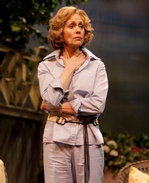
Judith Light in Children.
(Photo: Charles Erickson) |
Most importantly, this 35-year-old play isn't nearly as dated as you might expect. While Gurney's more recent work has been politically oriented (Mrs. Farnsworth, O Jerusalem, Screenplay, all at the Flea Theater in downtown NYC), family get-togethers still have a way of kicking up memories and unresolved issues, as evident in this sample from the playwright's more extensive and best-known ouevre — the chronicles that expose the Northeastern WASP milieu he grew up in. These gentle and always entertaining exposes skewered this group's inbred isms — conservatism and anti-Semitism — and their patrician habits and ironclad rules of good manners and duty (the latter tending to make adultery happen but rarely lead to a happily ever after outcome).
So sure, some of the customs Mother (Judith Light) sees being abandoned within her own family would have different references were the play set in 2009 instead of the early 1970s, but the urge to hold onto the status quo while coming to grips with the inevitable changes wrought by time and circumstance is timeless. The kicker to stir up the old memories during this weekend is that Mother, after five years of widowhood, is planning to marry the man her two sons and daughter know as Uncle Bill. Since this is not a marriage of convenience, but a love match, we soon realize that Mother's calm, cool and collected persona is the result of years heeding the dictates of duty rather than the heart. Given the terms of her late husband's will, remarriage means that ownership of the summer home passes on to the children and so Mother has invited the long absent son who's nicknamed " Pokey " because of his poker-faced demeanor and penchant for stirring things up —a tendency that has made him chronically dissatisfied with his work endeavors, but most of all with the way his family clings to its WASP-y value system.
It will come as no surprise that Pokey's presence after a five year absence and Mother's pending remarriage to the man suddenly more than a close-as-kin family friend will make this a stormy weekend despite the perfect for tennis and swimming weather. What IS surprising is how ahead of his time this prolific playwright was in writing a script that could show the various characters (the mother, her three children and their lovers, spouses) struggling, much like Chekhov's Russian gentry, to come to grips with their feelings about themselves, towards each other and the non-standstill world they live in.— and to do so with an economical four-member cast and within the 90-minute running time that's become increasingly popular with modern theater goers.
Gurney has managed to tell his story with just four actors on stage but to depict seven characters (more if you count three sets of children) who figure in the action. He does so by concentrating on Mother, divorced daughter Barbara (Katie Fineran), perennial preppy son Randy (James Waterston), and his also WASPdom born but ready for a change wife Jane (Mary Bacon). The very important to everything and everyone Pokey is invisible— as are Uncle Bill, Barbara's lover, the family's former gardener turned builder (shades of the Chekhovian peasant turned landowner) and Pokey's smart Jewish wife Miriam.
With John Tillinger a director known for his pacey helmsmanship in charge, the single act play moves smoothly from morning to evening. Yet the direction is subtle enough for the end product to have the feel of a longer, more full-bodied work. Popular songs like Show Me the Way to Go Home and Rui Rita's subtle lighting aid the transitions between scenes and James Noone's weathered wood house and patio evoke the tranquil summertime seaside setting.
The cast is as ideal as the weather. Judith Light brilliantly unravels the family matriarch's cool exterior to expose the complex emotions underneath. The "independence" speech with which she finally sheds the cucumber cool veneer is both funny and touching. James Waterston (son of TV's Sam and brother of two talented thespian sisters) gets the happily clinging to his preppy passions for tennis, swimming and sex Randy just right. Katie Finneran, is also excellent as his more complicated sister who unlike her mother left the man she married though loving another.
Mary Bacon is delightful as Randy's wife who has enough sensitivity for the never seen Miriam to perhaps help her break free from the less meaningful aspects of WASPdom as was the case for Pokey when he married her. But while Jane admires Miriam's loving and open relationship with her children and her studying for a PhD, sister-in-law Barbara, who's herself rebelling against the WASPy ways she's grown up via her love affair, still retains vestiges of her inbred anti-Semitism; to wit, she poo-poos Miriam's studiousness as a Jewish thing. In turn, Miriam (via dialogue by Jane) makes fun of Mary's coming out party ("Oh, a WASP Bar Mitzvah") when she sees Jane don the dress (a smashing creation courtesy of Jane Greenwood) from that event for a costume party at the yacht club
While John Cheever agreed that Children should be described as being "suggested by" his story rather than an adaptation, one of the pleasures for me in seeing this play, was how vividly it brought back Cheever's story. That story, like so many of Cheever's short works, was brilliant. Gurney added the mother and other characters and incidents and given a quite different interpretation to the outsider brother who in Cheever's story is very much front and center. Still, as a young literature teacher and budding playwright, Mr. Gurney couldn't have chosen a finer writer to jumpstart this early play. If seeing Children makes you pick up a book of John Cheever's stories, then it will be a doubly worthwhile experience— an enjoyable theater experience, topped by an equally enjoyable reading experience.
Production Notes
Children by A.R. Gurney
Directed by John Tillinger
July 1 — 12
Cast: Mary Bacon (Jane), Katie Finneran (Barbara), Judith Light (Mother), James Waterston (Randy). Sets: James Noone
Costumes: Jane Greenwood
Lights: Rui Rita
Sound: Scott Killian
Running Time: 90 minutes, without intermission.
Reviewed by Elyse Sommer at July 2nd performance
True West
|
I wanted to write a play about double nature, one that wouldn't be symbolic or metaphorical or any of that stuff. I just wanted to give a taste of what it feels like to be two-sided. It's a real thing, double nature. I think we're split in a much more devastating way than psychology can ever reveal.— Sam Shepard about True West.
|
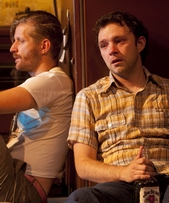
Paul Sparks and Nate Corddry
(Photo: T. Charles Erickson) |
The achieving brother Austin is at Mom's house to take care of her plants while she's on an Alaskan vacation, and is using the time to polish up a True American West project to pitch to a Hollywood producer. He hasn't seen good-for-nothing brother Lee for five years. Lee's unexpected appearance envelops the brothers' Pinteresque interchanges like a ready to burst dark cloud. As anyone familiar with Shepard's work knows, that cloud will turn into a tsunami which is likely to turn that spic and span kitchen/dining room into a mouth ajar popping mess. And as the house is turned upside down, so, of course, are the surface personas of the brothers.
Having seen this most accessible of Shepard's plays twice since it premiered in 1980, I still don't quite agree with those who would classify True West as the greatest play of the twentieth century. However, it is a highly entertaining pitch-black tragi-comedy which leaves you thinking about myths that defy retrieval, individual identity and family bonds.
When portrayed by the right actors it is still wonderfully watchable. John Malkovitch, Garry Sinise, Philip Seymour Hoffman and John Reilly have all been memorable, with Hoffman and Reilly alternating their parts during the play's revival at Broadway's Circle in the Square. Williamstown Theatre Festival hoped to add its own casting coup by having real life brothers Nate and Rob Corddry play Austin and Lee, but another commitment by put the Kabosh on this.
While watching two real brothers would have been fun, the folks at Williamstown are lucky that Paul Sparks was available to take on the role of Lee. Though perhaps a bit too handsome to play the greasy, sleazy drifter, Sparks is a long time intepreter of avante-garde playwright Adam Rapp's work and knows how to do menace. He and Corddry who plays the more low-key (at least until he indulges in a monumental binge) look nothing like each other, but neither do many brothers-- and neither did any actors previously playing these siblings.
Though the role of Lee is the showier role, Corddry convincingly turns his initial low key image around, just as Shepard subverts the whole mythology of the Hollywood western by letting neither brother fulfill his dream of being free as those western cowboys courtesy of the money earned fom making them live again on the screen. When Lee horns in on Austin's meeting with the project's producer and succeeds in setting up a golf game during which he pitches his own, more authentic than Austin's "true west" story, the focused professional turns into a Lee-like loose canon.
Austin's evolving "two-sidedness" gives Corddry several star turns. First, there's the hilarious big toast scene when Austin, after disproving his brother's disdainful "You couldn't steal a toaster without losin' your lunch," shows himself to be a hilarious blithe spirit, buttering toast as it pops out of the toasters he's stolen and lined up on the kitchen counter. Unsurprisingly, the toast ends up becoming part of the already mad disarray resulting from Lee's manic hunt for a pencil with which to write down the phone number of a woman whose name and address he can't quite remember. Corddry also does full justice to Austin's counter story to Lee's made-up western saga. It's a quiet recollection of the time he took their alcoholic father out for Chop Suey after he'd lost all his teeth only to have poor old dad drop the teeth into the take-home doggie bag and promptly leave both behind, never to be found again.
Though never seen, the dissolute father is a potent presence here as he is in other Shepard plays. It's evident that while Austin has tried to shake off his influence, that there's a little of him in both his sons. There are, however, two other actors who do appear, though their stage time is very brief : Stephen Kunken, recently seen as the one voice of reason in the ratings and power mad network office of Theresa Rebeck's Our House (review) is as tinseltown phony as you could want Hollywood producer Saul Kimmer to be. His polyester print shirt and suit (courtesy of costumer Linda Cho) deliciously defines 1980s style Hollywood tackiness. Debra Jo Rapp 's Mom exemplifies the virtues of understatement though her early return from Alaska to find her plants dead and her house (like her family) in shambles is essentially a walk-on part.
Director Daniel Goldstein's underscoring of the two-sidedness theme makes for some heavy-handed staging. Not content with Neil Patel's finely detailed (and gloriously wrecked) interior, Goldstein had the designer swivel it around from an initial exterior view. Actually, the whole house is positioned so that it's framed by what appears to be a movie studio (as if the story unfolding on stage were the one to be filmed). However, seeing stagehands and equipment at one side and above the set is a murky and distracting directorial touch. The over-abundance of prop movers between scenes is equally distracting.
The director has done a good job of streamlining what is already one of Shepard's leanest works, bringing it to a close in under two hours (including an intermission), a feat probably due to his toning down the Pinter pauses that have often led to comparisons between this play and Pinter's Homecoming.
While Austin is the writer in this family and the one who declares that he's the one who's in touch with the world ("I swallow the smog. I watch the news in color. I shop in the Safeway"), by the time True West comes to its open-ended finale, both brothers have become characters not in his but Lee's story. If you don't believe me, just listen to this excerpt:
"So they take off after each other straight into an endless black prairie. The sun is just comin' down and they can feel the night on their backs. What they don't know is that each of 'em is afraid, see. Each one of separately thinks that he's the only one that's afraid. And they keep ridin' like that straight into the night. Not knowing. And the one who's chasin' doesn't know where the other one is taking him. And the one who's being chased doesn't know where he's going."Better yet, go see this rarely revived play and hear Lee dictate the script that's in his troubled head to his brother.
Production Notes
True West by Sam Shepard
Directed by Daniel Goldstein July 15—26
Cast: Nate Corddry (Austin), Paul Sparks (Lee), Stephen Kunken (Saul Kimmer),Debra Jo Rupp (Mom)
Sound by Darron L West
Sets by Neil Patel
Fight Choreography by Thomas J. Schall
Costumes by Linda Cho
Stage Manager Paul J.Smith
Lighting by Ben Stanton
Reviewed by Elyse Sommer 7/15/09
The Torch-Bearers
| Only remember this, Paula — there will be actresses when husbands are a thing of the past— the vainglorious Mrs. J. Duro Pampinelli when the happily married Paula Ritter evubces her reluctance to sacrifice the status quo to satisfy the stirrings of theatrical ambition.
|
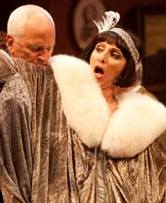
Andrea Martin and John Rubinstein in the WTF's revival of George Kelly's 1922 comedy
(Photo: T. Charles Erickson) |
Having Rob Corddry exit True West cost the revival its newsmaking edge of having two real brothers duke it out on stage, but having Paul Sparks available to step into the role of Lee ultimately gave the production its strongest asset. The revival of George Kelly's 1922 comedy The Torch-Bearers about the doings (and mis-doings) of an amateur theater group had to replace Mrs. Nelly Fell, the troupe's rich, thrice married chief script prompter when an injury forced Dana Ivey to drop out. While Ms. Ivey has a long record as a proven asset to any play, director Dylan Baker couldn't wish for a funnier Mrs. Fell than Andrea Martin who last wowed Broadway audiences in Exit the King. In fact, despite The Torch-Bearer's having an abundance of terrific actors, Martin comes close to stealing the show.
Unfortunately, the loss of Marian Seldes as the haughty, self-deluded Mrs. Pampinelli has dealt a major blow to the Williamstown production. While Katherine McGrath has an impressive resume, she is simply not as to the Pampinellian manner born as Seldes was. when Baker staged The Torch-Bearers for a brief and triumphant run in a tiny off-off Broadway theater nine years ago. It's not that McGrath muffs her lines (misdelivered and forgotten lines are kept within the purview of Pampinelli's thespian stumblebums). Thanks to Ilona Somogyi's colorfully artsy outfits she looks quite grand. But somehow McGrath's Pampinelli moves and gestures lack the elegant, over-the-top grandeur the role calls for. With Martin's Mrs. Fell coming so much closer to Seldes' exquisitely realized comic excess, the role of the "directress" who is the heart and soul of Kelly's play, comes across less as the troupe's Pied Piper than just another member of the band.
As central as the Pampinelli role is to the proceedings —a rehearsal for One of Those Things, the play within Kelly's play which is the prologue for the second act's backstage-on-stage coup de thèâtre at the Horticultural Hall or what Mrs. P. dubbed Kitchy-Kutchey— the secondary and more benignly spoofed characters are also important to Kelly's put-down of the community theater movement that was in full flower when he was making his name in the theater. With enough Williamstown favorites to make the most of the drolly amateurish amateurs, especially during that Noises Off like middle section, the laughter rippling through the audience was loud and frequent enough to indicate that word of mouth is likely to fill the seats for the rest of this run.
In their important roles in the mis-directed marital infidelity drama guided to its pratfall laden performance at the Kitchy-Kutchey (these extend right through the curtain calls), Edward Herrmann and Katie Finneran are hilariously lacking in stage chemistry. Philip Goodwin's Mr. Twiler amusingly keeps losing his paste-on moustache. Becky Ann Baker makes Paula Ritter's acting debut awful enough to shock her husband (John Rubinstein) into a dead faint, though the always excellent Baker could use a little more vulnerability. Mr. Ritter's collapse hints that his wife inherited the part becasue a similar trauma inconveniently killed the husband of the previous leading lady, Clara Sheppard (Jessica Hecht, a star quality actress who gets as much mileage as she can from what amounts to a walk-on part). The most delightful bumbler of all is Yousef Bulos as Mr. Spindler the prop man who gives new meaning to the word malaprop.
Hecht isn't the only case of talent being more or less squandered, but this is all part of bringing together actors who have long been part of what is known as the "Williamstown family." Sam Waterston's Teddy Spearing has little to do besides tossing some peanuts at Finneran with whom he appeared earlier in the season in A. R. Gurney's Children.
Rubinstein's affable but outspoken Mr. Ritter, who probably representas Kelly's opinion of these thriving amateur theatricals, gets the last laugh. However, neither the final scene in which Ritter does his own bit of playacting to keep his sanity as well as the sanctity of his home or the opening scene that's basically a set-up to get the large cast on stage are not on a par with the wonderful Keystone Kops mid-section. Still, Mr. Baker, who adapted Kelly's script to conflate the three acts into two, has added some nice touches throughout.
As he did in the off-off-Broadway production, he has again tapped into the humor of the pull between homemaker and ham by having Paula pass around refreshments throughout the rehearsal which makes it more than likely that her hostess with the mostest side will trump the new-born actress. Baker has also concocted a program (handed out by the company crew intermission) for the play within The Torch-Bearers, complete with amusing cast bios and hints at an amorous relationship between the "directress" and her "promptress. " Most importantly, Baker expertly masterminds Mrs. Pampinelli's disastrous backstage shenanigans so that every misstep is a comic triumph.
The production values are top of the line on all counts. The whole cast is costumed to the hilt of period elegance. David Korins' handsome replica of a comfortable middle class living room swivels with ease for the backstage doings at the Kitchy-Kutchey. The rearview of the stage cleverly afford occasional glimpses of the actors in silhouette and the exits at the sides as well as two constantly malfunctioning doors insure that One of Those Things stumbles its way to the curtain calls with nonstop confusion.
George Kelly is nowadays more likely to be known as Grace Kelly's uncle. He got his start as a playwright with The Torch-Bearers and another comedy, The Show-Off. Adept as he was at casting an unforgiving eye at pretentious poseurs like Mrs. Pampinelli even as he endowed them with memorably funny vitality, he by-passed the chance to become another Moss Hart or George Kauffman and turned to more serious dramas. This led to r Craig's Wife which won him a Pulitzer and was filmed three times. Both the early comedies and the prize winning drama found their way between covers in an anthology with an introduction by the late Wendy Wasserstein. For my review of that book go here
Production Notes
The Torch-Bearers by George Kelly
Adapted and directed by Dylan Baker
Cast: Becky Ann Baker (Mrs. Paula Rittersis), Yusef Bulos (Mr. Spindler), John Doherty (Mr. Stage Manager), Katie Finneran (Miss Florence McCrickett), Phillip Goodwin (Mr. Ralph Twiller), Jessica Hecht (Mrs. Clara Sheppard), Edward Herrmann (Mr. Huxley Hossefrosse), Lizbeth MacKay (Jenny), Andrea Martin (Mrs. Nelly Fell), Katherine McGrath (Mrs. J. Duro Pampinelli), John Rubinstein (Mr. Frederick Ritter), James Waterston (Teddy Spearing).
Set designer: David Korins
Costume designer: Ilona Somogyi
Lighting designer: Rui Rita
Sound designer: Alex Neumann
Original Music: Michael Garin
Dialect Coach: Stephen Gabis
Stage Manager: Gregory T. Livoti
July 29 - August 9.
Reviewed by Elyse Sommer on July 30th
Quartermaine's Terms
| You have the most amazing ability not to let the world impinge on you.<—Mark Sackling to St. John (Sinjin) Quartermaine.
|
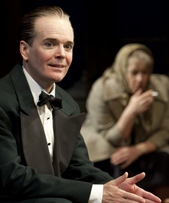
Jefferson Mays (background: Ann Dowd)
(Photo: T. Charles Erickson) |
Now Maria Aitken, the director who flawlessly brought to fruition the ingenious concept of staging Alfred Hitchcock's 39 Steps with just four actors, has gathered a sterling ensemble for a crowd pleasing revival at the Williamstown Theatre Festival's. With Jefferson Mays the embodiment of the perenially pleasant and polite superfluous man who is nevertheless the one the audience's eyes seek out, don't be surprised if this funny, poignant St. John Quartermaine (tighten your upperlip for the Britspeak pronunciation: Sin Jin) and his colleagues head for a Broadway theater before too long.
Gray, who himself continued to work as a college lecturer despite his success as a playwright, knows these drudges of academia well. He did not write plays with a lot of action so don't expect the sort of frenetic pacing, scenic bells and whistles that marked her direction of 39 Steps.
Quartermaine's Terms, while also funny, is character driven with a deeper, sadder undercurrent pulsing beneath the comedy. If some of the laughs teased from embarassingly torn trousers and the daily disasters of family life at times call to mind some British sitcoms like Are You Being Served, in Gray's hands these broad comic touches are masterfully balanced with poignant Chekhovian sadness. Getting to know these average people — the ones on stage as well as those never actually seen who complicate their lives away from the campus– makes for far better than average theater.
It takes a bit to get acclimated to the clipped speech patterns that underscore the Englishness of thisplay. That said, however, these characters' yearnings and disappointments are universal and Quartermaine, for all his British good manners, is ultimately a sad hybrid of two characters created by American writers, Edward Arlington Robinson's Miniver Cheevy and Arthur Miller's Willy Loman.
For Quartermaine the school is the only place where he has a semblance of human interaction even though it's mostly as a sympathetic listener who seems unfazed by cancelled invitations, the fact that even his offers of free theater tickets and baby or sick-mum sitting are rejected, and by the novel writing Mark Sackling's (Stephen Kunken) sarcastic appraisal of his impossible to unruffle cheerfulness (the above quoted "you have the most amazing ability not to let the world impinge on you"). But if you watch Mays — the way his fingers clasp the arms of the old chair that's his fly-on-the-wall retreat, often even before the end of his classes (he's as inept and out of touch in the classroom as everywhere else), and listen to the frequent overly enthusiastic declarations of " terrific," what you're seeing is a hopelessly tragic man hanging on to a non-life. At first glance, Mays' trim, boyish good looks make him seem a bit young for the part of an aging bachelor who appears to belong to another era, but this actually ratchets up his brilliant portrait of a man who's never fully engaged in life.
Though Mays' Quartermaine is the character you'll remember long after the curtain falls (and this production has a real curtain the way all plays one did), the other six characters are also vividly brought to life and under, Ms. Aitken's direction convey a touching picture of how life keeps forcing people to adjust to the changes in their personal relationships and working environment.
The already mentioned Stephen Kunken couldn't be better as the teacher with doomed to fail literary ambitions; Morgan Hallett is excellent as the teacher whose never seen roving husband turns out to be the perennial candle not worth the game when she wins him back. Ann Dowd makes the most of Melanie Garth's scene as the spinster teacher who can no longer contain her regrets about rejecting her one opportunity for love and again when there's a possibility that she might be facing a situation more dire than her long stint as her mother's caretaker. Jeremy Beck is amusing as the the new teacher who turns the comedy into farce with his accident proneness. Simon Jones is just right as the aptly named Henry Windscape, and the next in line to Eddie Loomis, the aging homosexual head of the school, another expert portrayal by John Horton.
Derek McLane's unit set has just the right touch of 1960s non-tech seediness, its windowed French doors providing occasional glimpses of the campus beyond the clubby staff room. Kevin Adams' lights, Drew Levy's sound and Martin Pakledinaz's costumes round out the excellent production values.
This is an old-fashioned play, which was a throwback to another era even when it first opened. But when performed and staged as smartly as it is here, it still retains its power to make ordinary people's lives extraordinarily moving.
Production Notes:
Quartermaine's Terms by Simon Gray
Drected by Maria Aitken
Cast: Jeremy Beck (Derek Meadle), Ann Dowd (Melanie Garth), Morgan Hallett (Anita Manchip), John Horton (Eddie Loomis), Simon Jones (Henry Windscape), Stephen Kunken (Mark Sackling), Jefferson Mays (St John Quartermaine)
Sets by Derek McLane
Costumes by Martin Pakledinaz
Lighting by Kevin Adams
Sound by Drew Levy
Dialect Coach Stephen Gabis
Stage Manager Stephen M. Kaus
August12–23
Reviewed by Elyse Sommer 8/13/09
Nikos Stage
Knickerbocker
| What is the statue of limitation on parental responsibility?— Raymond, during the initially hostile but ultimately warmest and most touching scene with Jerry, his 40-year-old son who is not quite ready to himself be a father.
|
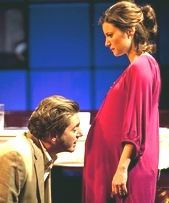
Reg Rogers and Susan Pourfar
(Photo: T. Charles Erickson) |
Jerry is a stand-in for the playwright in more ways than one. Sherman too was forty when his own now 2-year-old son was born. Like Jerry he lost his mother when he was a youngster and has a history of substance abuse — what's more, as Jerry still has to find his way toward being able to embrace the obligations of parenthood as a scary but joyful thing, so Sherman still has to find his way towards applying his talent to scripts that add up to more than a few fine scenes. Alas, none of his previous plays, which include Evolution (see links at end of this review), a Nikos Stage premiere also directed by Nicholas Martin, have failed to add up to a satisfying sum of their best parts. Knickerbocker, despite some excellent performances, amusing dialogue and handsome staging, does not break that spell.
Adding the angst of becoming a father to the more than typical self-absorbed forty-something man sounding like a twenty-something floundering on the cusp of manhood simply isn't enough to make Jerry's story interesting to anyone except him. He loves the mother-to-be Pauline (Susan Pourfar), and she him; in fact, she's calm and reassuring about his "I'm not ready" spoutings. Even though former girlfriend Tara (Annie Parisse) makes an appearance in the fictional New York eatery (named Knickerbocker, per the title, for its association with anything distinctly American and the knee-length breeches that once distinguished boys from grownup men in long pants) where the entire play unfolds, Tara is a steadfast friend to Pauline and the marriage seems reasonably problem free which makes for a rather tepid drama.
Reg Rogers, who last demonstrated his dazzling ability to inhabit a character at this very stage in Theresa Rebeck's The Understudy (review) wrests as much emotional and humorous mileage from this man who must crack through the shell of adolescent insecurity (he's a cross between a Jerry Seinfeld and George Constanza who also kept returning to their favorite restaurant booth in their all about nothing sitcom). But even this Wow! actor can do just so much with a character who's likeable but not particularly memorable and a story that meanders to a predictable ending with a few chuckles and touching moments but nothing to engage you emotionally or stimulate post-show discussion.
Alexander Dodge sets the scene nicely with colorful sliding panels to facilitate the scene-to-scene shifts that cover the period between Pauline's it's a boy! sonogram and the much discussed baby ready to be born. Keeping Jerry more or less tethered to the restaurant booth seems to be the playwright's equivalent of a parent sending his child to his room until he's learned to change his unacceptable behavior. As each forward move in time brings someone else to share his table, we become more familiar with the whys and wherefores of why Jerry feels unready for this major event in his life. Of course, while the naughty child can't wait to leave his room, Jerry hangs on to the place symbolizing his unencumbered by babies life. I'm hardly a spoiler when I tell you that by the time the lights go down, he will be ready to leave the Knickerbocker restaurant and do so with less of the forty years of accummulated emotional baggage.
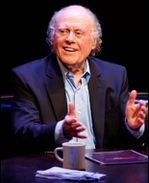
Bob Dishy
(Photo: Charles T. Erickson) |
The play does finally come to more poignant and meaningful life with the entry of veteran actor Bob Dishy as Jerry's father Raymond.
Dishy, who can make you laugh just by raising an eyebrow, finally manages to undo years of a problematic father-son relationship. While he brings plenty of his own baggage to the table, he's astute enough to understand his son's neediness and give him the reassurance he needs to deal with the scary but joyful obligation of fatherhood. What starts out funny turns into an exchange of memories including Jerry's amazement that his father could have missed being part of the famous Woodstock concert ("too much traffic") or one by the Beatles "(too many screaming girls") turns into a Pinteresque moment when both men agree to "Let It Be" (the title of the Beatles' last album about leaving problems behind and moving on). What follows is a genuinely poignant epiphany for both men which carries over for Jerry's final scene with his wife.
I should also mention that Jerry does leave the booth once early on in the play to step in front of those sliding panels and relate the true story of one of the amazing people profiled in the Guinness Book of Records. That man, Roy Sullivan, amazingly lived thrugh seven lightning strikes and killed himself at age seventy because of an unhappy love affair. According to an interview with dramaturg Amy Lipman in the program notes, this set Sherman to thinking about the choices and happenstance of our lives generally and Jerry's specifically. To be honest, the connection is even more of a stretch than much of what else passes for plot— unless it's that for much of Knickerbocker you're likely to find yourself wishing for lightning to strike and stop some of the endless talk.
Other Jonathan Marc Sherman plays reviewed at Curtainup
Sophistry(2009)
Evolution-Berkshires
Evolution/-Off-Broadway
Things We Want
Production Notes
Knickerbocker by Jonathan Marc Sherman
Directed by Nicholas Martin
Cast: Brooks Ashmanskas (Melvin), Peter Dinklage (Chester), Bob Dishy (Raymond), Rightor Doyle (Steve), Annie Parisse (Tara), Susan Pourfar (Pauline, Reg Rogers (Jerry); Knickebocker waitstaff: Ben Bandell, James Morosini, Ashley Sumner, Alison Yates.
Set designer: Alexander Dodge
Costume designer: Gabriel Berry
Lighting designer: Philip Rosenberg
Sound designer: Alex Neumann
Production stage manager: Jillian M. Oliver
Running Time: 95 Minutes without an intermission
From July 8-July 19, 2009
Reviewed by Elyse Sommer July 9th
What Is The Cause Of Thunder?
| I hate living my own life.— Ada, for whom the soap opera she's been starring in for 27 years is more meaningful than her real life so that the possibility of having her character killed off is as traumatic as death.
|
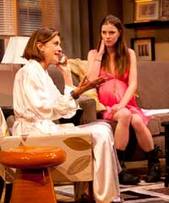
l-r:Wendy Malick & Betty Gilpin
(Photo by T. Charles Erickson) |
If you sense something unreal about the kneeling woman and the unconventionally non-pious nun, right you are. You see, the scene is an episode from the soap opera in which the praying woman has been a character for 27 years and it ends with the nun's (Betty Gilpin) hilariously surprising exit courtesy of costume designer Nicole V. Moody.
The program lists just two actors, the play actually features a handful of characters who are either unseen or played by the versatile Gllpin. These characters identified next to her program listing under the catchall of "et al" include soap diva Ada's real life daughter and very pregnant daughter Ophelia, her TV daughters (one wheelchair-bound and occasionally comatose, the other her evil jailbird twin) and their brother rising from the grave in which he was buried (alive!) as an infant. While in an interview with WTF dramaturg Claire Drobot, playwright Haidle explains his writing the script for such a small cast was dictated by the realities of producing plays in today's economy, no such economic concerns apply to the staging.
This is as richly endowed with bells and whistles production as you're likely to see anywhere in the Berkshires (or, for that matter, on or off-Broadway). If Malick wasn't so elegantly impressive and Gilpin nothing short of amazing in her wizardly persona shifts, it would not be remiss to dub Alexander Dodge's set design as this production's star. Certainly, if the Williamstown interns can take a curtain call bow, Dodge should be called on stage for a well deserved round of applause. Dodge should bring along costumer Moody and sound designer Fitz Patton. Moody outfits Gilpin with such flair and originality that there are times when you feel you ought to pull out your opera glasses to make sure that this is the same person you just saw in a totally different role. Fitz Patton makes up for the fact that the title question is referred to several times but never answered by creating very authentic claps of thunder.
Unfortunately, neither the gifted actors, the inventive design team or the best efforts of director Justin Waldman can make Haidle's comedy rise to the comedic potential o that opening scene. His basic plot about a soap opera actress for whom the life of her TV character has become more real and meaningful than her real life which is devoid of any satisfactory relationships is a clever variation of a time tested forumula that dates back to the 1947 movie, Double Life. That' still a popular golden oldie DVD a won Ronald Colman an Oscar for his portrayal of a veteran stage actor who, while playing Othello, falls victim to the actor's malady of mixing roles with reality. Haidle's dealing with this concept comically rather than as a moody film-noir has given the the excellent Malick and Gilpin neither consistently funny or gripping material to work with.
The realistic bow to economical casting actually works in the play's favor since Gilpin's multiple role shifts are great fun to watch, a bit reminiscent of Charles Ludlum's enduringly popular The Mystery of Irma Vep. However, despite some nice touches of absurdity the humor loses its fizz well before the end of the 90-minute run time (mercifully shortened from the originally intended two acts). The surreal comic business never allows the genuine poignancy of a woman who has escaped from her inability to relate to anyone, even her own daughter, only to be faced with having her character killed off due to the network's common ailment— low ratings— to engage our sympathy. The same holds true for the pain experienced by a daughter yearning for love and attention as more than a scriptgirl/assistant. Also a misfire is the hint that there's a darker side of the story indicating that Ophelia, contrary to her name, is stronger than her mother and that the potential end of her career is only the final of many episodes indicating her descent into madness.
This is the fourth time I've found myself questioning the wunderkind status that has attached itself to Haidle since his graduation from Julliard. His three previous plays reviewed at Curtainup (see links to reviews below) were all given beautiful productions at highly regarded Off-Broadway theaters. All were buoyed by fine performances, but were propelled downhill by the author's failure to sustain his penchant for mixing ironic surrealism and realism. All left us with a sense that, as Les Gutman put it in his review of Rag and Bone, "there should be something more waiting to flow from the playwright's pen " and the hope that he'll let us see what's really deep down in his heart rather than continuing "to hide behind stick figures and banal diversions." Sad to say, this latest handsomely produced and superbly acted world premiere, still leaves us waiting.
Links to other reviews of plays by Haidle
Mr. Marmalade- 2005
Rag and Bone-2007
Saturn Returns-2008
Nikos Production Notes
What Is The Cause Of Thunder? by Noah Haidle
Directed by Justin Waldman. Cast: Wendie Malick (Ada), Betty Gilpin (Ophelia et al Set designer: Alexander Dodge
Costume designer: Nicole V. Moody
Lighting designer: Jeff Croiter
Sound design and original music: Fitz Patton.
Stage manager: David Sugarman
Running Time: 90 minutes without an intermission
July 22 - August 2, 2009.
Reviewed by Elyse Sommer on July 23rd
Caroline In Jersey
| I'm an actress. . .with a very good temp job — Caroline assuring her potential landlady in Jersey that she can be relied on to pay the rent.
|
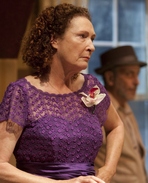
Brenda Wehlle, Will LeBow (rear)
(Photo by T. Charles Erickson) |
If you like ghost stories that combine whimsical humor with poignance, you're not alone. Besides such examples of the genre as the old Topper movies, recent Broadway ghost stories that have done well includeThe Seafarer and a revival of the ever popularBlithe Spirit. As portrayed by Will LeBow, the ghost in Caroline in Jersey is a funny and endearing a fictional ghost, for sure, the first ever who spent his earthly existence as an accountant. While bringing him and Caroline together in the upstairs apartment of the house in New Jersey owned by his daughter Mimi (the always wonderful Brenda Wehle is in top form) may seem far fatched and a bit of whimsy-excess, Lopez manages to neatly tie together the the stories of the distraught Caroline, the ghostly ex-CPA , the grumpy Mimi and Caroline's gay best friend David (Matt McGrath).
Lopez's Caroline is an actress with a rent-paying law in a law office who has more in common with the emigrant's experience of loss and alienation than that of the successful New York career girl in the Caroline sitcom. Her New York life has become one of loss piled on top of loss — with the wound from losing a child, exacerbated by the pain of having her husband impregnating a college girl. The move to New Jersey isn't quite like crossing an ocean and cutting all ties with her former life —she still has to work with her (never seen) husband who's directing David's Off-Off-Broadway musical with the hit-sound-alike title Petz. However, as immigrants often gravitate to their own kind to weather the adjustment, it turns out that Caroline has landed among kindred spirits: both the landlady and the ghost seen only by her are both musical theater lovers!
I'm not giving anything away by telling you that there's a ghost in Caroline's new apartment since the play opens up with LeBow picking out a tune on a small upright piano and quickly, with an assist from lighting designer Jake DeGroot, make a distinctly ghostly exit as Caroline and her future landlady enter to inspect the apartment and discuss whether it's to be or not to be hers to rent. Fantastical as Caroline's getting her bliss back and ridding herself of her anger through her encounters with Will the ghost is, the healing process, which extends to Mimi and Will, adds up to a lot of fun. That fun is considerably enhanced by the the musical interludes that include a charming bit in which Thompson in her Petz costume (a witty contribution by costumer Emily Rebholz) sings and also the frequent references to theatrical greats, notably accountant Will's client Arthur Miller. Yes that's the Arthur Miller whose Death of a Salesman is Will's benchmark for good theater.
Though Caroline in Jersey is hardly in a league with Arthur Miller's Salesman, Le Bow's wise and witty ghost goes a long way towards forgiving its not being the answer to Will's complaint that "they don't make them like that any more." So do the other cast members, most especially Brenda Wehle. She is magnificent as the sort of sour, middle-aged woman who according to Will should not be seen by a dead parent since the sight of her would evoke a sense of having died a second time. Wehle deliciously shifts personas when she has a Cinderella-like night at the theater and has her own epiphany. Amanda Charlton who directed another WTF premiere two summers ago (Dissonance) does a good job of keeping the spooky humor from getting out of hand and not letting allowing the emotional moments to turn into soap-operatic shtick.
While lacking the thematic muscle of Miller or other greats in the theatrical canon, Caroline in Jersey is likely to have a life beyond Williamstown-- maybe not on Broadway, but like Petz, its musical within the play, Off or Off-Off-Broadway or in New Jersey and other states with active theater companies.
Production Notes:
Caroline In Jersey by Melinda Lopez
Directed by Amanda Charlton
Cast: Will LeBow (Will), Matt McGrath (David),Lea Thompson (Caroline), Brenda Wehle (Mimi)
Sound by Bart Fasbender
Sets by Andrew Boyce
Original Music Kyle Jarrow
Costume by Emily Rebholz
Lighting by Jake DeGroot
Stage Manager Libby Unsworth
Running Time: 2 hours, including one intermission
August 5 to August 16
Reviewed by Elyse Sommer on August 6th


